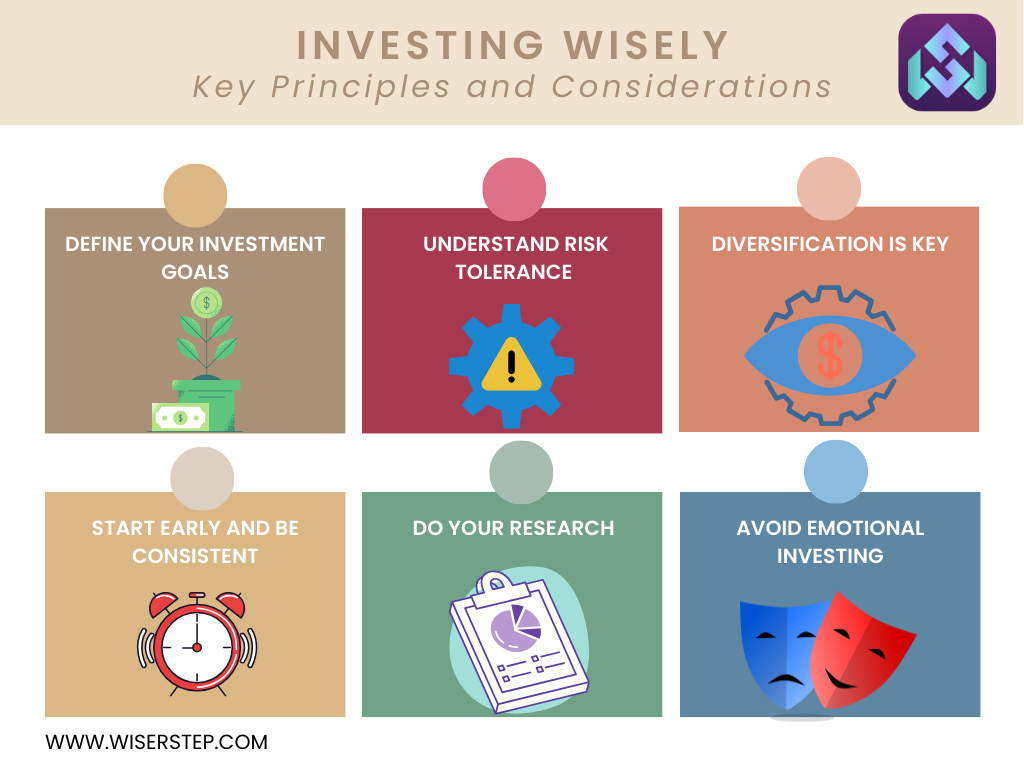Investing wisely is an essential component of building long-term wealth and achieving financial goals. However, investing can be daunting, especially for beginners. With the right approach and knowledge, anyone can make informed investment decisions. In this blog, we will explore the key principles of wise investing and highlight important considerations to keep in mind on your investment journey.
Define Your Investment Goals
Before diving into the world of investing, it’s crucial to define your investment goals. Ask yourself what you want to achieve through investing. Are you saving for retirement, a down payment on a home, or funding your child’s education? Having clear objectives will guide your investment strategy and help you determine your risk tolerance.
Understand Risk Tolerance
Understanding your risk tolerance is vital. It determines the types of investments you should consider. Generally, risk and potential return are correlated; higher-risk investments have the potential for greater returns but also come with a higher chance of losing money. Assess your comfort level with risk and choose investments that align with your risk tolerance.
Diversification is Key
One of the fundamental principles of investing is diversification. Diversifying your investment portfolio involves spreading your money across various asset classes like stocks, bonds, real estate, and cash. Diversification can help mitigate risk because different assets tend to perform differently under various economic conditions. A well-diversified portfolio can provide stability during market fluctuations.
Start Early and Be Consistent
Time is your most valuable asset when it comes to investing. The sooner you start, the more time your investments have to grow. Consistency is equally important. Make regular contributions to your investment accounts, whether it’s monthly or annually. This practice, known as dollar-cost averaging, can help reduce the impact of market volatility and potentially increase your returns over time.
Do Your Research
Before investing in any asset, take the time to research and understand it. This includes learning about the underlying companies if you’re investing in stocks, the credit quality if you’re investing in bonds, or the location and potential for growth if you’re investing in real estate. Informed decisions are more likely to lead to successful investments.
Avoid Emotional Investing
Emotions can be a significant detriment to your investment success. Avoid making impulsive decisions based on fear or greed. Market fluctuations are normal, and it’s essential to stay focused on your long-term goals. It’s often wise to have a well-thought-out investment plan and stick to it, even when markets are volatile.
Keep Costs Low
High fees and expenses can eat into your investment returns over time. Be mindful of the costs associated with your investments, including management fees, trading commissions, and expense ratios. Consider low-cost investment options.
Monitor and Rebalance Your Portfolio
Your investment portfolio should evolve with your financial goals and changing market conditions. Periodically review your investments to ensure they align with your objectives and risk tolerance. Rebalance your portfolio when necessary to maintain your desired asset allocation. For example, if stocks have performed exceptionally well and now make up a larger portion of your portfolio than intended, consider selling some to reinvest in other asset classes to maintain diversification.
Long-Term Perspective
Successful investing requires a long-term perspective. Markets can be volatile in the short term, but history has shown that, over the long run, they tend to trend upward. Avoid reacting to short-term fluctuations and stay committed to your investment strategy.
Seek Professional Advice When Needed
Investing can become complex, especially as your portfolio grows. If you’re unsure about your investment decisions, consider seeking advice from a financial advisor or planner. They can provide valuable insights, help you set goals, and create an investment strategy tailored to your needs.
Investing wisely is a journey that involves careful planning, discipline, and continuous learning. By defining your goals, understanding your risk tolerance, diversifying your portfolio, and following these key principles, you can work towards achieving your financial objectives. Remember that investing is not a one-size-fits-all endeavor, and your strategy should be tailored to your unique circumstances and goals. Stay focused on the long term, be patient, and avoid making hasty decisions based on emotions. With time, dedication, and informed choices, you can build a strong and resilient investment portfolio.

